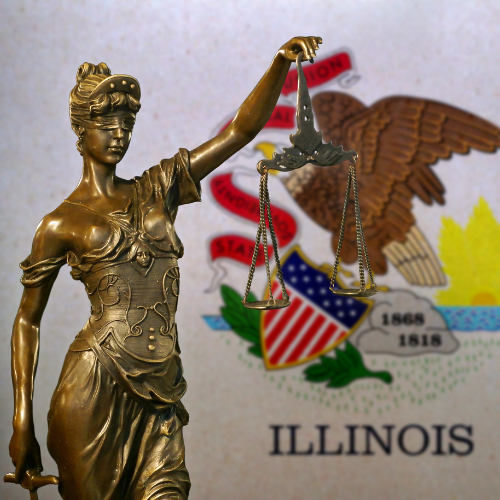May 2025 IICLE FLASHPOINTS
MAY 2025 FOCUS AREAS
Employment & Labor

Admissible Evidence Necessary to Support Claim to Overtime Wages Under FLSA
by Catherine R. Locallo
Real Estate Law

Dog Bites, Landlords and Tenants, a Rickety Fence, and a Public Alley
by Genevieve M. Daniels
Spotlight Author Shawn M. McCullough

Our May 2025 FLASHPOINTS Author Spotlight recognizes Shawn M. McCullough, who most recently worked on ESTATE ADMINISTRATION: BUSINESS AND TAX-RELATED ISSUES (IICLE®, 2025) as a contributing author and as a speaker presenting Basis Planning: Maximizing Tax Efficiency for Estates and Transfers at the IICLE ESTATE PLANNING SHORT COURSE 2025. McCullough has also served as an author for REVOCABLE GRANTOR TRUSTS (IICLE®, 2023) and LIMITED LIABILITY COMPANIES (IICLE®, 2022).
Read Full SpotlightFEATURED HANDBOOKS
FLASHPOINTS is a complimentary monthly newsletter featuring current legal updates and trending topics in various practice areas. IICLE®, a 501(c)(3) non-profit organization, produces materials like these to support the career growth of Illinois legal professionals. Thank you to our contributors, sponsors, and readers. For information about becoming an IICLE® contributor, please find resources located here.
Criminal Law
Fourth District Appellate Court Reverses Grooming Conviction Due to Improper Admission of Prejudicial and Irrelevant Testimony
In People v. Marshall, 2025 IL App (4th) 240368, the Fourth District Appellate Court reversed a defendant’s grooming conviction because the trial court erred in admitting evidence of the defendant sending a former girlfriend sexually explicit photos when they were minors and testimony from a pastor about the defendant’s church volunteer training.
The defendant was charged with grooming based on a Snapchat exchange that he had with a minor in which he sent her a photo of his genitals. 2025 IL App (4th) 240368 ¶¶19 – 20. The defendant and the minor met at a church where the defendant was a volunteer supervisor. 2025 IL App (4th) 240368 at ¶4.
The trial court granted the state’s motion in limine to allow the defendant’s ex-girlfriend to testify about receiving sexually explicit photos from the defendant when they were minors. The trial court ruled that this testimony was false exculpatory evidence because the defendant denied sending sexually explicit photos to anyone in his police interview. 2025 IL App (4th) 240368 at ¶¶9, 26. The trial court also granted another motion in limine by the state to allow the church pastor to testify about volunteer training procedures and give his opinion about communications between the volunteers and students because the testimony was relevant to show the defendant’s intent and knowledge. 2025 IL App (4th) 240368 at ¶11.
The defendant did not testify at his trial, and he was found guilty by a jury. 2025 IL App (4th) 240368 at ¶¶1, 61.
The appellate court reversed and held that the testimony from the ex-girlfriend and the pastor was improperly admitted. 2025 IL App (4th) 240368 at ¶¶55, 63. The appellate court noted that the ex-girlfriend’s testimony was unrelated to the charges against him because “[w]hether defendant sent photos of his penis to someone other than B.W. on a prior occasion was not relevant to the current charge.” 2025 IL App (4th) 240368 at ¶50. The appellate court concluded that the defendant’s statements denying sending naked photos to anyone during his interview were not exculpatory. Id.
False exculpatory statements such as a false alibi, implicating someone else, denying having contact with a victim, giving numerous explanations on how a victim’s injury occurred, or giving implausible stories about how a defendant’s own injuries occurred are admissible as admissions and as evidence of consciousness of guilt. 2025 IL App (4th) 240368 at ¶48.
However, a lie is not a false exculpatory statement if it is not directly related to the charged offense. Therefore, the ex-girlfriend’s testimony about receiving nude photos from the defendant was unrelated to the charges against him. The defendant’s denial of sending anyone naked photos of himself was not exculpatory. 2025 IL App (4th) 240368 ¶¶49 – 50.
The appellate court also found that the ex-girlfriend’s testimony was unduly prejudicial because there was no probative purpose for it and her testimony had “absolutely nothing to do with whether the defendant was guilty of grooming B.W. at the age of 20.” 2025 IL App (4th) 240368 at ¶55.
Next, the appellate court emphasized that the ex-girlfriend’s testimony was improper impeachment on a collateral matter through extrinsic evidence. Although a witness can be impeached through evidence that tends to contradict or undermine the believability of the witness’s testimony, that evidence cannot be offered if it is merely collateral to the issues in the case. Extrinsic evidence, which consists of evidence from someone other than the witness, cannot be used to impeach a witness about a collateral issue. 2025 IL App (4th) 240368 at ¶¶58 – 59.
The appellate court further emphasized that when a defendant does not testify, evidence cannot be admitted to impeach the defendant’s credibility. (However, the state can still show the falsity of a defendant’s exculpatory statements. See People v. Watson, 103 Ill.App.3d 992, 431 N.E.2d 1350, 1353, 59 Ill.Dec. 593 (4th Dist. 1982). This should be limited to the substantive evidence at issue in the case). Since the defendant did not put his credibility at issue in the trial, the state was not allowed to discredit him through impeachment. 2025 IL App (4th) 240368 ¶¶60 – 62. Further, the state improperly impeached him on a collateral matter through the ex-girlfriend; namely, to contradict his police interview in which he denied sending nude photos to other people. 2025 IL App (4th) 240368 at ¶63.
Finally, the appellate court concluded that the pastor’s testimony about the defendant’s conversations with the minor was irrelevant to establish whether the defendant had the intent to commit grooming. The pastor did not have firsthand knowledge about whether the defendant was ever informed about the church policies that he violated when he communicated with the minor, nor did the pastor train the defendant. 2025 IL App (4th) 240368 at ¶¶70 – 71.
The state also used the pastor’s testimony as improper propensity evidence because it argued to the jury that since the defendant was willing to violate church policies, then he was willing to violate the law. Therefore, the pastor’s testimony should have been barred. 2025 IL App (4th) 240368 at ¶72.
For more information about criminal law, see CRIMINAL RECORDS: EXPUNGEMENT AND OTHER RELIEF (IICLE®, 2024). Online Library subscribers can view it for free by clicking here. If you don’t currently subscribe to the Online Library, visit www.iicle.com/subscriptions.
Employment & Labor Law
Admissible Evidence Necessary to Support Claim to Overtime Wages Under FLSA
The plaintiff filed a lawsuit against her former employer alleging that the employer failed to compensate her for working overtime for a three-year period, as required by the Fair Labor Standards Act of 1938 (FLSA), ch. 676, 52 Stat. 1060. The district court granted summary judgment in favor of the defendant and the plaintiff appealed. The seventh circuit affirmed, holding that the plaintiff failed to meet her initial burden of establishing that she worked overtime when she only alleged vague and unsupported assertions, and that a jury could not infer from the evidence what amount of overtime was worked, if any. Osburn v. JAB Management Services, Inc., 126 F.4th 1250 (2025).
The FLSA establishes minimum wage, overtime pay, recordkeeping, and youth employment standards affecting employees in the private sector and in federal, state, and local governments. Overtime pay at a rate of not less than one and one-half times the regular rate of pay is required after 40 hours of work in a workweek.
Background Facts
The defendant, JAB Management Services, Inc., hired employees to provide prison healthcare to contracted entities. The plaintiff, Tara Osborn, was initially hired in 2009 as an administrative assistant. She was promoted several times, including to the position of technical support specialist, providing on-call support regarding inmate medical records. 126 F.4th at 1255. This is the position she last held with the company prior to termination. The technical support specialist is a fully remote, salaried, nonexempt position. Osburn’s responsibilities included providing on-call support to Advanced Correctional Healthcare customers, including issues related to the records system. While JAB Management’s regular business hours were 8:00 a.m. to 5:00 p.m., Osburn could design her own schedule since the position she held was remote. Id. JAB Management’s timekeeping system did not allow her to enter time outside of their regular business hours. Id.
At some point, Osburn’s supervisors became dissatisfied with her ability to communicate and manage her workload. She could not explain what she was working on throughout the day and several tasks had to be assigned to others. JAB Management provided her with coaching. She was terminated on August 2, 2021, when her performance did not improve. Id.
Osburn sued JAB Management following her termination, in part, claiming that they failed to pay her overtime in violation of the FLSA. Id. A three-year look back period applied to her claim, as it was alleged that the violation was willful. 126 F.4th at 1256. (Non-willful violations have a two-year look back period.) Osborn claimed to have worked an average of 10 hours per day and 15 hours of overtime per week. When asked to describe her work, Osborn stated she “had to work outside of normal business hours to take support calls, respond to emails, drive to client sites, and ‘patch servers.’ ” She also claimed to work from time to time on the weekends. 126 F.4th at 1255.
Osborn admitted she did not track any time she worked over 40 hours. JAB Management admitted that it did not track her overtime either. Id.
District Court Decision
JAB Management moved for summary judgment. The district court ruled that Osburn could not carry her initial burden of showing a violation of the FLSA because she “failed to prove the amount and extent of her work, let alone work in excess of forty hours a week, as a matter of just and reasonable inference.” [Emphasis added.] 126 F.4th at 1258. Osborn appealed to the seventh circuit.
The Seventh Circuit’s Analysis
The seventh circuit first clarified that the burden of proof at summary judgment (Rule 56) differs from the “just and reasonable difference” standard, noting the just and reasonable inference standard ‘applies to damages questions only after an employee has met the initial burden to ‘establish[ ] liability.’ ” 126 F.4th at 1256.
A plaintiff must first establish employer liability. One only gets to the damages question if liability is assessed. To establish liability for overtime compensation, an employee must present evidence of the hours worked. This can be established through the employee’s testimony, which is what Osburn tried to do. However, to survive summary judgment, the employee’s evidence must place the employee’s version of events beyond the level of mere speculation or conjecture. As the seventh circuit noted, while employees need not describe their schedules “ ‘with perfect accuracy,’ they should be able to offer ‘testimony coherently describ[ing]’ their typical workweeks.” 126 F.4th at 1259.
When questioned at her deposition for details on what she did for 10 hours per day, Osborn responded vaguely that she worked on “[c]ustomer issues, the database, the reports, it is very labor intensive.” Id. While Osborn claimed to have coworkers who could testify regarding her workload, none provided such testimony. Id. The court found her claim of consistently working 15 hours of overtime per week to be inconsistent with her acknowledgement that the call volume declined, and her duties changed significantly over time. 126 F.4th at 1260.
Relying on case precedent from other circuits, the Seventh Circuit held, “[t]he evidence [the plaintiff] has produced fails to provide us with even a general sense of her typical workweek.” 126 F.4th at 1260. Further opining that, “[i]f this claim survived summary judgment, then any FLSA claim in which the employee vaguely describes [their] schedule as having exceeded forty hours per week would reach a jury.” Id.
Top 3 Takeaways for Employers
- Employers should not only rely on the work hours set forth in a job description as the specific hours worked for nonexempt employees.
- Conclusory and vague estimates about an employee’s average workweek, without more, do not permit a fact finder to conclude an employee worked overtime.
- Employees claiming unpaid overtime have a burden of producing at least some admissible evidence of their specific overtime hours worked and the duties they allegedly performed during those hours.
For more information about employment and labor law, see CAUSES OF ACTION: EMPLOYMENT ACTIONS (IICLE®, 2024). Online Library subscribers can view it for free by clicking here. If you don’t currently subscribe to the Online Library, visit www.iicle.com/subscriptions.
Estate Planning & Probate
Review Restricted Stock Agreement When Planning for Business Owner to Retain Ownership Interest in Revocable Trust
When a business owner creates a revocable trust, the owner designates one or more current and successor trustees. In most cases, the grantor of the trust (the business owner) acts as the initial trustee and thereby takes advantage of the Illinois law approving the use of a self-declaration of a trust. 760 ILCS 3/401. This arrangement allows the owner to retain all authority over the interests, as the owner would if the owner was held individually.
If the owner plans to retain ownership of interests under a revocable trust, the practitioner should review the company’s restrictive stock agreement. The agreement should define the owner’s revocable trust as a permissible owner of shares. Otherwise, the agreement should be revised accordingly to permit such alternate ownership. An example of an appropriate provision for this purpose would read as follows:
Permitted Transfers. A shareholder may transfer shares as provided in this section without complying with the other terms of this Agreement, provided the transferee accepts such shares subject to all of the terms and conditions of this Agreement. A shareholder may transfer, assign, bequeath, or transmit [his] [her] shares to a “Family Trust.” For this instrument, “Family Trust” means a trust under which the trustee has the discretion to distribute income or principal to any one or more of a shareholder’s Family Members, any trust under which one or more of a shareholder’s Family Members has a right to the income or principal, and any revocable trust under which a shareholder is the grantor and is the principal beneficiary during the shareholder’s lifetime. “Family Member” means a Shareholder’s spouse, natural or adopted child, or other lineal descendant. Any amendment of any Family Trust or exercise of a power of appointment under any Family Trust in such a manner that it is no longer defined as a “Family Trust” hereunder shall be deemed a transfer of the shares held by the trustee of that trust to a person who is not a permitted transferee.
Following the death of an owner who acts as a trustee, the successor trustee will assume the trusteeship. 760 ILCS 3/704. The owner, therefore, will need to consider beforehand the appropriate choice of a trustee who can undertake this responsibility. That is, the successor trustee must be capable of assuming responsibility for the voting, management, allocation, and possible disposition of the business interests.
An owner naturally may consider the appointment of a family member as the successor trustee. However, if the family member is not otherwise involved in the owner’s business, then this choice may not be appropriate with respect to the owner’s interests. An unqualified successor trustee may not be able to address the various unique responsibilities inherently linked to the management of the business interests retained in the trust. Additionally, the appointment of a family member as the successor trustee could further stress any intrafamily relationships that are already fraught.
An owner may also consider the appointment of a corporate trustee as the successor trustee. However, if the corporate trustee maintains corporate policies that discourage the acceptance of appointments over trusts holding business interests, then the trust’s attorney may face undue delays in securing the corporate trustee’s acceptance of office. This delay, in turn, could adversely affect the uninterrupted administration of the trust, along with the voting, allocation, and possible disposition of the underlying business interests.
One possible solution to address the issues that arise when appointing family members or corporate trustees would be to consider appointing cotrustees or a special trustee. When considering appointing cotrustees, one of the two trustees could be someone with intimate knowledge of the business or who would be properly skilled at continued ownership of the business. The cotrustee solution does create an additional administrative burden, which can be substantial for closely held business interests that require active participation. Appointing a special trustee solely to hold title to the business interests may be considered when a corporate trustee maintains policies that prohibit it from acting as trustee when the trust owns a closely held business interest.
The prudent practitioner should consider the use of a business advisor in conjunction with a trustee if the owner believes a family or corporate trustee cannot or should not maintain responsibility over the management of the business interests. The prudent practitioner should also consider the application of the Illinois prudent investor rule (PIR) (760 ILCS 3/900, et seq.) and include trust provisions designed to protect a trustee who holds business interests as trust investments.
Get 20% off this book ESTATE ADMINISTRATION: BUSINESS AND TAX-RELATED ISSUES (IICLE®, 2025) when you use discount code 20FPTS at checkout!
Please note: This discount can only be applied to the 2025 edition of Estate Administration: Business and Tax-Related Issues. Discount code must be applied at checkout. Offer valid from May 15-29, 2025. No rain checks or extensions will be granted. This coupon code may not be combined with any other discount, subscription rate, special rate, special pricing, or special offer.
Real Estate Law
Dog Bites, Landlords and Tenants, a Rickety Fence, and a Public Alley
Some of us of a certain age will recall what happened when Inspector Clouseau asked a hotel proprietor, “Does your dog bite?” After nearly getting his hand bitten off, the following question remains: would the proprietor have been liable to Inspector Clouseau for not adequately warning him that the dog did indeed bite? Luckily, a recent case out of the first district, Garcia v. Bawcum, 2025 IL App (1st) 240802-U, helps shed light on what may or may not trigger an Illinois landlord’s liability when a tenant’s dog bites someone, especially when the injury occurs off the leased premises.
Facts
Robert Jewell, Cynthia Jewell, and Jewell Properties, LLC (collectively, the Jewells), owned a property that they leased to the defendant, Doris Bawcum. 2025 IL App (1st) 240802-U at ¶4. The backyard at the leased premises contained a common area bounded by a picket fence that separated the common area from the public alley. Id. The fence was “rickety” and had been in disrepair since Bawcum had moved into the property. Id.
Enter Bawcum’s dog, Titan. One day, Titan escaped Bawcum’s control and forced himself through the deteriorating fence and into the alley, where he bit plaintiff Myrian Garcia’s leg. 2025 IL App (1st) 240802-U at ¶5. Apparently, Titan had been involved in two prior incidents of which the Jewells were not aware. Id. Garcia filed suit against the Jewells under a theory of negligence, arguing they had a duty to maintain the fence and prevent such incidents. 2025 IL App (1st) 240802-U at ¶6. The Jewells moved for summary judgment, arguing they owed no duty to Garcia, and the trial court agreed. 2025 IL App (1st) 240802-U at ¶7. Garcia timely appealed. Id.
Appellate Court
Generally speaking, “a landlord is not liable for injuries caused by a dangerous or defective condition on the premises leased to a tenant and under the tenant’s control.” 2025 IL App (1st) 240802-U at ¶9. Moreover, Illinois courts have repeatedly rejected the claim that landlords should be responsible for dog bites that take place off the leased premises. 2025 IL App (1st) 240802-U at ¶11, citing Sedlacek v. Belmonte Properties, LLC, 2014 IL App (2d) 130969, ¶32, 16 N.E.3d 878, 384 Ill.Dec. 485, and Solorio v. Rodriguez, 2013 IL App (1st) 121282, ¶28, 987 N.E.2d 452, 369 Ill.Dec. 825. Here, Garcia was bitten in a public alley, not on the leased premises. Id.
Garcia’s arguments (and the appellate court’s analysis) largely centered around Klitzka v. Hellios, 348 Ill.App.3d 594, 810 N.E.2d 252, 284 Ill.Dec. 599 (2d Dist. 2004).2025 IL App (1st) 240802-U at ¶12. Specifically, Klitzka held that a landlord who relinquishes control of a property to a tenant owes no duty to third parties who are injured while on the leased property unless an exception applies. Id., citing Klitzka, supra, 810 N.E.2d at 255 – 256. Having said this, the court in Klitzka also laid out six exceptions that could trigger landlord liability, including (1) when a latent defect exists at the time of the leasing that the landlord should know about and (2) when the landlord voluntarily undertakes to render a service. Id. Garcia argued that under these two exceptions, there was at least a factual question that precluded summary judgement. Id.
The appellate court disagreed, finding that the Jewells did not owe a duty to Garcia. First, because there was no evidence that the Jewells ever voluntarily took responsibility for maintaining the fence, they could not be liable for its condition. 2025 IL App (1st) 240802‑U at ¶13. Noting that the voluntary undertaking exception should be narrowly construed, the appellate court relied heavily on the analysis of Sedlacek, supra, 2014 IL App (2d) 130969 at ¶¶30 – 31, which it found had almost identical facts to the case before it. Id. Specifically, the court in Sedlacek held that only an express promise to fix the fence to contain a dog would constitute a voluntary undertaking. The Sedlacek court also found the landlord’s original intent to fix the fence to contain animals generally had been abandoned through inaction. Id. Here, because the Jewells never made any promise or took any action to fix the fence for any reason, including to contain Titan, there was no voluntary undertaking on which they could be held liable to Garcia. 2025 IL App (1st) 240802-U at ¶13.
Second, there was no latent defect present. A latent defect is one that is “hidden and not readily observable or discoverable to any but the most searching examination.” 2025 IL App (1st) 240802-U at ¶14. Because the fence’s rickety condition was an obvious defect that Bawcum would have known about at the time she entered her lease, the Jewells had no duty to warn Bawcum about it or to fix it. Id. Moreover, the common area rear yard was never a fully enclosed space, which was also a condition Bawcum was aware of at the time she entered her lease, so there could be no expectation that the rear yard was sufficient to contain Titan. Id.
For all these reasons, Garcia’s claims against the Jewells failed as a matter of law and entry of summary judgment was appropriate. 2025 IL App (1st) 240802-U at ¶15.
For more information about real estate law, see MORTGAGE FORECLOSURE: CORRESPONDING ISSUES (IICLE®, 2024). Online Library subscribers can view it for free by clicking here. If you don’t currently subscribe to the Online Library, visit www.iicle.com/subscriptions.
Workers’ Compensation
Second District Appellate Court Upholds Reinstatement of Workers’ Compensation Claim Despite Delay, Citing Denial of Notice and Pandemic Disruptions
In Ryba v. Illinois Workers’ Compensation Commission, 2025 IL App (2d) 230596WC-U, the Workers’ Compensation Commission Division of the Illinois Appellate Court for the Second District reversed the circuit court and reinstated the decision of the Commission.
Mary Catherine Ryba, the claimant, filed two applications for adjustment of claim in 2016 under the Workers’ Compensation Act, 820 ILCS 305/1, et seq., seeking benefits for work-related back injuries sustained while employed by Libertyville Manor Extended Care. 2025 IL App (2d) 230596WC-U at ¶4. The employer filed several motions for hearing in 2018 and 2019. After several procedural delays, the case was set for a hearing on February 18, 2020. Id. The claimant failed to appear for trial, and the arbitrator dismissed the case for want of prosecution.
On April 29, 2021 — 436 days later — the claimant moved to reinstate the case. 2025 IL App (2d) 230596WC-U at ¶5. The claimant argued she never received notice of the dismissal. Her counsel also cited a lack of receipt of a notice of case dismissal. Her counsel also claimed there were disruptions caused by the COVID-19 pandemic, as well as a death in the legal team’s family.
Despite the significant delay, the arbitrator reinstated the case. The arbitrator primarily based the decision to allow reinstatement on the claimant’s counsel’s claim that his office never received a written notice of the dismissal and the fact that the Commission was shut down during the period when the case was dismissed and the date a petition to reinstate was due. 2025 IL App (2d) 230596WC-U at ¶7. The arbitrator also found it significant that the Commission had suspended the mandatory trial “Red Line” from March 2020 to November 2021. Id. The arbitrator then proceeded to hear the case and awarded benefits to Ryba.
The Commission affirmed the arbitrator’s findings in full, including the decision to reinstate. The employer appealed to the circuit court.
The circuit court reversed. The circuit court found the arbitrator lacked jurisdiction to vacate the dismissal with prejudice because the statutory 60-day period to file for reinstatement had passed. 2025 IL App (2d) 230596WC-U at ¶8. The circuit court noted that the notice of dismissal was sent to all parties on February 19, 2020, and that caselaw confirms receipt of notice is established upon the date of mailing with confirmation of the sender. Id. See also Talmage v. Union Cent. Life Ins. Co., 315 Ill.App.623, 43 N.E.2d 575 (1st Dist. 1942); Tabor & Co. v. Gorenz, 43 Ill.App.3d 124, 356 N.E.2d 1150, 1 Ill.Dec. 868 (2d Dist. 1976).
The circuit court also found that even if the Commission had jurisdiction, the factual determination of the arbitrator did not support reinstatement, and found that the Commission failed to consider evidence against reinstatement.
On appeal to the appellate court, a number of issues were presented:
1. Did the arbitrator and the Commission have jurisdiction to reinstate a case dismissed for want of prosecution more than 60 days after the dismissal?
2. Did the Commission abuse its discretion in allowing reinstatement based on the claimant’s denial of notice and surrounding circumstances?
3. Were any of the employer’s additional challenges to the merits of the award preserved for appellate review?
The appellate court reversed the circuit court and reinstated the Commission’s decision in full.
The appellate court held that under Illinois law, a party’s denial of receipt of a dismissal notice creates an issue of fact. Therefore, the Commission was within its authority to assess credibility and determine that the 60-day reinstatement clock had not begun to run. 2025 IL App (2d) 230596WC-U at ¶8. The court cited Talmage, supra, in affirming that any determination of whether notice of dismissal was received is a factual issue and therefore the province of the Commission. The appellate court noted the claimant’s denial of receipt of notice rebutted the presumption of mail delivery of notice and created a question of fact for the Commission to decide. The appellate court therefore concluded that the arbitrator and Commission had jurisdiction.
The court found no abuse of discretion in the Commission’s decision to reinstate. The appellate court found the unique combination of the COVID-19 pandemic, procedural confusion regarding the “Red Line,” and personal hardship experienced by the claimant’s counsel supported the Commission’s conclusion that reinstatement was warranted despite the delay. 2025 IL App (2d) 230596WC-U at ¶15. The appellate court was unable to say the Commission’s decision was arbitrary, fanciful, or unreasonable. The court reiterated that it was not its role to reweigh evidence or substitute its judgment for that of the Commission.
Finally, the appellate court rejected the employer’s arguments that the appellate court review the award of the arbitrator. The employer did not raise these issues before the circuit court. The appellate court found the failure to raise issues as to the award resulted in their forfeiture, citing Fernandes v. Industrial Commission, 246 Ill.App.3d 261, 615 N.E.2d 1191, 1197, 186 Ill.Dec. 134 (4th Dist. 1993).
This case reaffirms the principle that when receipt of notice is denied, the presumption of delivery can be rebutted, and jurisdictional timelines under administrative rules may not bar relief if material factual disputes exist. The court also emphasized the broad discretion afforded to the Commission in managing procedural matters, especially under exceptional circumstances such as the COVID-19 pandemic.
For more information about workers’ compensation, see WORKERS’ COMPENSATION PRACTICE (IICLE®, 2023). Online Library subscribers can view it for free by clicking here. If you don’t currently subscribe to the Online Library, visit www.iicle.com/subscriptions.
FLASHPOINTS SPOTLIGHT
Our May 2025 FLASHPOINTS Author Spotlight recognizes Shawn M. McCullough, who most recently worked on ESTATE ADMINISTRATION: BUSINESS AND TAX-RELATED ISSUES (IICLE®, 2025) as a contributing author and as a speaker presenting Basis Planning: Maximizing Tax Efficiency for Estates and Transfers at the IICLE ESTATE PLANNING SHORT COURSE 2025. McCullough has also served as an author for REVOCABLE GRANTOR TRUSTS (IICLE®, 2023) and LIMITED LIABILITY COMPANIES (IICLE®, 2022).
McCullough is an attorney and certified public accountant with the Trusts & Estates group at Harrison LLP and concentrates his practice in estate planning, trust administration, and probate. He advises clients on implementing estate plans to meet their legacy goals while minimizing their exposure to estate tax liability. In addition to estate planning, McCullough also advises fiduciaries in trust administration and represents executors in probate court.
McCullough started his career as a CPA prior to attending law school. As a CPA he advised clients on a range of issues including tax compliance, preparation of financial statements, preparation of fiduciary accountings, and representing clients before the IRS. McCullough’s accounting background remains a strong asset when advising clients on transfer tax planning and in preparation of gift and estate tax returns.
McCullough noted that IICLE was an important resource for him while in law school and in the early stages of his legal career. In fact, McCullough stated, “I still use IICLE’s publications as a starting point when I need to learn new concepts or brush up on the law. I became an author for IICLE to share my knowledge so future attorneys can experience these same benefits.”
McCullough is a graduate of Indiana University and earned his Juris Doctorate from the Chicago-Kent College of Law in 2015. He is an active member of the Chicago Bar Association and the Chicago Estate Planning Council. McCullough is also a board member and currently serving as the Vice Chair of The Admiral at the Lake Foundation.












